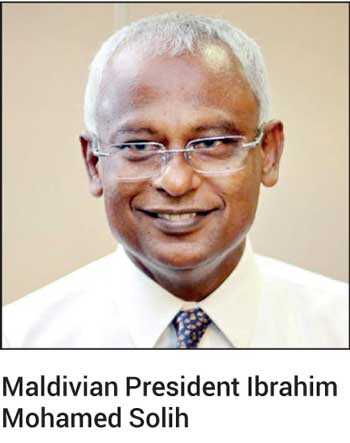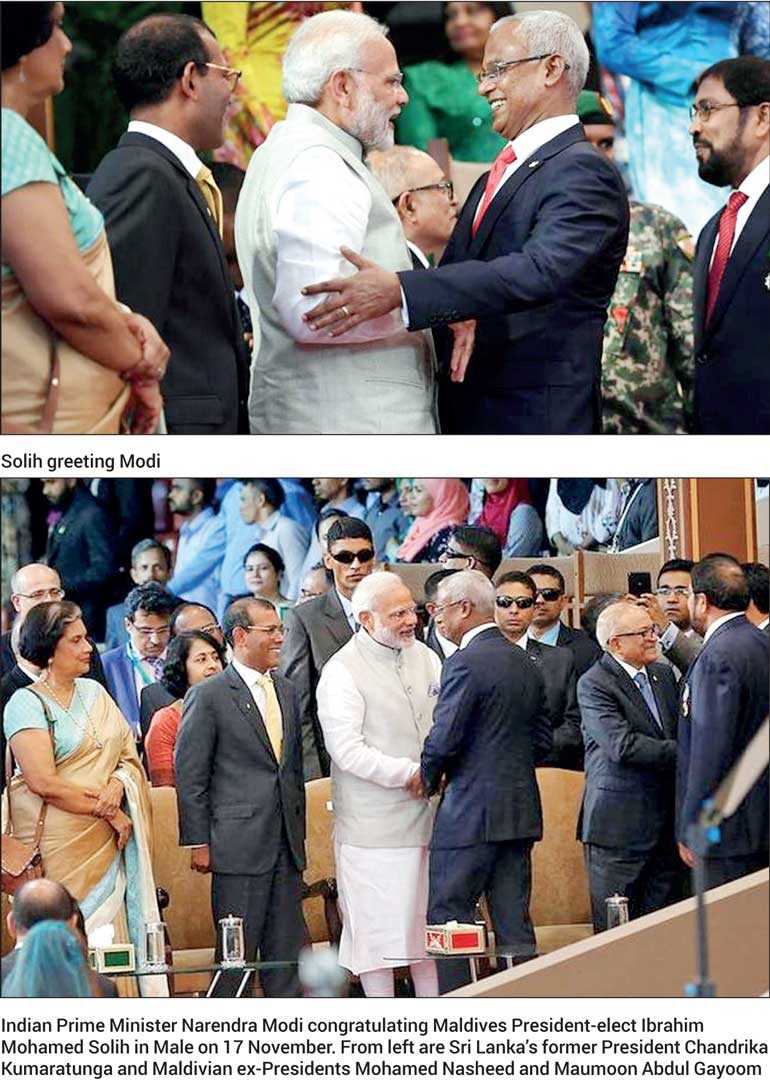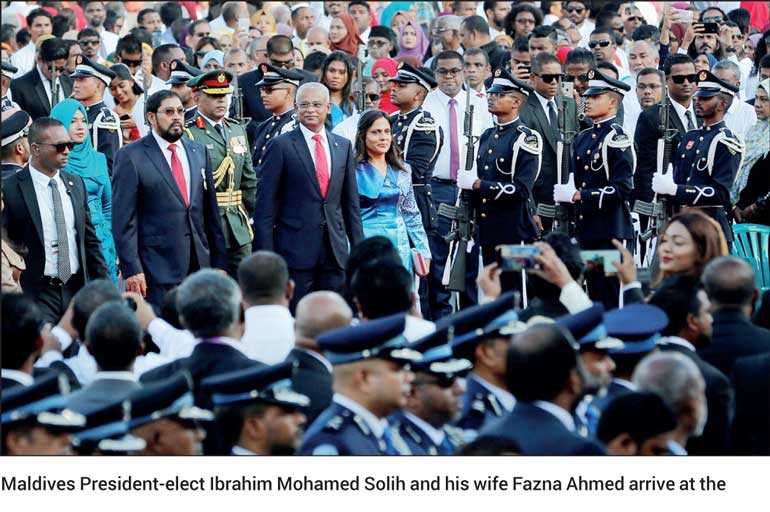Wednesday Feb 18, 2026
Wednesday Feb 18, 2026
Saturday, 24 November 2018 00:10 - - {{hitsCtrl.values.hits}}
 The newly-elected Ibrahim Mohamed Solih Government in the Maldives is likely to follow a balanced foreign policy rather than one which is slanted towards one foreign power or the other.
The newly-elected Ibrahim Mohamed Solih Government in the Maldives is likely to follow a balanced foreign policy rather than one which is slanted towards one foreign power or the other.
Given the defeat of the manifestly pro-China Abdulla Yameen in the 23 September presidential election, foreign media reports blithely assumed that President Solih would swing towards India and the West abandoning China altogether.
Indeed, the optics on 17 November, the day on which Solih was ceremonially installed as President, would have given such an impression.
Indian Prime Minister Narendra Modi was the only Head of Government to attend the ceremony and he was quite clearly the star of the show.
In contrast, China was represented by Luo Shugang, Minister of Culture and Tourism.
In his speech to Maldivian MPs, Solih said: “We will endeavour to fortify the existing ties the Maldives has had with India and other regional countries. “
India was the only country the President mentioned specifically.
Solih briefed Modi about the “dire economic situation” facing the Maldives, but without saying that the $ 1.5 billion foreign debt the Maldives owes is due to the debt to China.
President Solih told Modi about the pressing need for increased housing and infrastructure development as well as for establishing water and sewerage systems in the outlying islands. Modi sought more opportunities for Indian companies to invest in the Maldives in different sectors. It was announced that the Maldivian Minister of Foreign Affairs Abdulla Shahid will make an official visit to India on 26 November.
Maldives chopper
A day after Solih was sworn-in, the country’s new Defence Minister Mariya Ahmed Didi said that the Maldives would not be returning the two Indian naval helicopters gifted to the country.
“It’s not in our culture to ask neighbours to take back what they give,” Mariya said.
Former President Abdulla Yameen had wanted them out because he feared that its Indian crew were intelligence operatives. However, after extensive discussions, the Yameen Government extended the deadline to remove the helicopters to December.
Past experience
 However, going by what happened after a similar regime change in Sri Lanka and Nepal, and the statements of the new leaders in the Maldives, a radical anti-China swing is unlikely.
However, going by what happened after a similar regime change in Sri Lanka and Nepal, and the statements of the new leaders in the Maldives, a radical anti-China swing is unlikely.
Experience in South Asia, shows that parties which came to power playing the anti-China card tended to crawl back to China after a period of investigations into the terms of the Chinese contracts and loans.
In Sri Lanka’s case, the re-negotiated deal with China on the $ 1.2 billion Hambantota Harbour signed by the “anti-China” Wickremesinghe Government, was vastly more favourable to China than the previous one negotiated by a supposedly “pro-China” Rajapaksa Government.
China got Hambantota Port on a 99-year lease and with a 70% stake in it, while Rajapaksa had offered only a 35-year lease in his time.
The $ 1.4 billion Colombo Port City project was heavily criticised during the 2015 presidential and parliamentary elections as a white elephant and as an environmental threat and was stalled for 16 months. But eventually, it was resumed with some modifications which were not really unfavourable to China.
The city area was extended from the initial 233 hectares to 269 hectares, and the land given to China was converted from freehold to a 99-year lease. The revised agreement gave China a greater role in the city’s development but in partnership with others.
In the Maldives, the two km long bridge between capital Male and the island of Huluhumale was highly criticised by the then Opposition as an unwarranted investment. But it is proving to be a boon for overcrowded Male. Connected by the bridge, Hulhumale provides Male much-needed lebensraum. The all-weather bridge is helping Huluhumale develop as a satellite town relieving pressure on Male.
The Maldives-China Free Trade Agreement (MCFTA), signed in November 2017 and passed by Parliament, was also slammed for being heavily one-sided and secretive. It was rushed through Parliament in 10 minutes without the numbers required to back it.
The head of the main ruling party, the Maldivian Democratic Party (MDP), Mohamed Nasheed, told Reuters that the Solih Government would abrogate the agreement.
But the Solih Government is proceeding cautiously. Foreign Minister Abdulla Shahid said: “The FTA has been already signed. So the Government can only say anything after finding out all the details. If we say anything without finding out all the details it can harm relations between the two countries. So first, we must find out all the details before commenting.”
“We need to find out details of the loans and free aid given to us by China. We need to find out the weight of the loans and reshape the loan agreements in a way that we can carry them,” Shahid said.
According to Customs statistics, the Maldives imported $ 342 million worth of goods from China between January and August this year. Exports amounted to $ 265,270 during the same period. This is by no means a “yawning” trade gap.
With the MCFTA offering zero duty to fish exports, Maldives will be able to greatly expand fish exports to China. At present Maldivian fish exports overall are valued at $ 121.5 million.

China unfazed
Unfazed by the developments, China has said it has a “firm and clear cut will” to maintain good ties with the Maldives. During his meeting with Chinese Tourism Minister Luo Shugang on 17 November, President Solih had praised China.
“China has offered the most development assistance to the Maldives,” Solih reportedly said. He mentioned various projects like the Friendship Bridge which have brought tangible benefits to the Maldives.
The Chinese State-run Global Times daily said in an op-ed article recently, that “Solih is viewed as pro-India by the Indian and Western media. However, pro-India does not necessarily mean anti-China”.
“Due to close geographic distance, it is normal for India to have such a large influence on small Indian Ocean countries. China’s cooperation with these countries was never meant to replace India’s influence,” the article said.
“India and China should support these small countries in adopting a stable foreign policy and protecting foreign investment. The two nations can also carry out mutual third-party cooperation to seek a win-win scenario and stabilise the entire region,” the Chinese official daily said.
“Undoubtedly, China has its own stakes in the Indian Ocean as it is an important gateway for China’s opening-up. But China’s cooperation with Indian Ocean countries is not to squeeze out any other country,” it said.
China is the biggest investor in the Maldives. Chinese investments account for $ 2.37 billion in a total FDI of $ 3.22 billion.
India’s exports to the Maldives are just a wee bit lower than China’s. In 2016, Indian exports to the Maldives were valued at $ 275,665, 477, while China’s were valued at $ 285,640,637.
Writing in Global Times, Long Xingchun, Director of the Center for Indian Studies at China West Normal University and a senior research fellow with The Charhar Institute said: “The Maldives may lend priority to India in its foreign relations, but it won’t constrain itself to India.”
“The building of infrastructure by China in the Maldives has created favourable conditions for the business and personnel of Indian companies on the island country. China and India can actually help boost Maldives’ development by using their own strengths.”
Two plus one formula
China has come up with a constructive “two-plus-one” mechanism, namely, China and India plus another South Asian country, as a demonstration of sincerity.
“This aims to harmonise relations between countries and serves the interest of all relevant parties, and is worth a careful consideration by New Delhi. Perhaps the two powers can have a try in the Maldives first,” Long Xingchun wrote.
